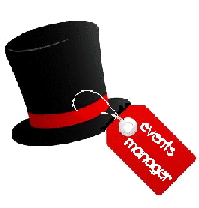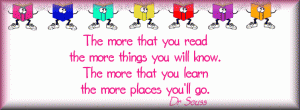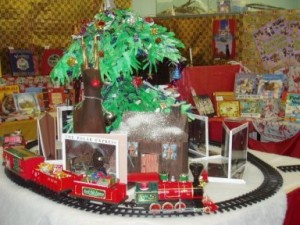Whoever thought being a teacher librarian would encompass being an events manager? Staid, middle-aged women guarding and counting the books in the the twilight of their careers having such a glamorous title goes right against the stereotype! But in fact, it’s one of the most important roles we can have if we are to get out students to be readers.
We all know the competition that we have from other media for occupying children’s leisure time and while, in the past, the “passive” activity of reading only had to compete with the more passive activity of television viewing, especially after dark when outside play and sport was no longer an option, now there is the interactivity of computer games and other screen-based activities to compete with. Coupled with the observation of Donalyn Miller (aka The Book Whisperer) that by the time students reach Year 6 they view reading as a school-related subject only and it is a means to an end to complete assignments, our role of reader leaders is more critical than ever.
If our students are going to be readers they need to see it not only as a valid, valuable and valued use of their spare time but they also need to see it as fun! Something they want to do rather than something they have to do. And we, as teacher librarians, are in the best position to do that.
Even after we have created the most enticing and exciting environment in the school there is much that we can do to persuade our students that reading can be right alongside their other activities and that rather than competing it can complement it.
special events
Scattered throughout the year are many events that are focused on literature and literacy that lend themselves to creating a special event
- Library Lovers Day (February 14)
- International Book Giving Day (February 14)
- Read Across America to celebrate Dr Seuss’s birthday (March 2)
- World Read Aloud Day (first Wednesday in March)
- World Poetry Day (March 21)
- World Storytelling Day (Autumn/Spring Equinox)
- International Children’s Book Day (April 2)
- World Book Day on April 23
- Put A Poem In Your Pocket Day (April 30)
- National Simultaneous Storytime (May 27)
- The Reading Hour (August 18)
- Australian Children’s Book Week (August 22-28 2015)
- Indigenous Literacy Day (September 2)
- International Literacy Day (September 8)
- The Global Read Aloud (October)
- Picture Book Month (November)
Susan Stephenson (aka The Book Chook) has compiled a more extensive list of these and each lends itself to a library-focused celebration. Often there are particular themes associated with the event and there are always discussions and suggestions for ideas on teacher librarian networks but consider asking the students how they think a particular event could be celebrated. Share the load of ideas, organisation and implementation.
literary luncheons
Literary luncheons sound so elegant and can be so much fun.
Select and set aside a day a month (such as the third Friday) for the entire school year. Use the calendar to identify any special events that might be occurring close to that date, including those that might not be related to literature and literacy) and use that as your focus. Consider how you can bring a literature focus to the event. For example, Harmony day might involve looking at books about peace and examining the peace movement of the 60s. Or invent a theme such as Cinderella Day when participants read and hear all the different versions of Cinderella from cultures around the world, or perhaps have a focus on a particular author or character. Cast the net as widely as you can so that more students are attracted and understand that the library does have something to them.
Organisation is quite simple, particularly if you involve your student assistants. Have them devise the publicity strategies and be responsible for its production and display. Also have them develop the program, selecting texts to be shared, activities to be undertaken (and organising the required resources)and deciding if a guest speaker is appropriate If there is to be a guest speaker, have them write the invitation explaining its purpose and what would be required of the speaker. Students are also responsible for thanking the speaker at the end. Putting the responsibility of running the event on the shoulders of the students not only lessens your workload (although as the adult you need to oversee everything for feasibility) but also gives them ownership and helps them develop an array of life skills.
Participating students just have to bring their lunch and enjoy – or arrangements could be made with the school canteen or the Home Economics faculty to cater for it.
Promote the event to the local newspapers and television stations who are always looking for local colour – another avenue for advocacy.
author visits
Author visits involve preparation, time and money but given they can be better than a visit from Santa as the joy is relived every time the child picks up one of the author’s works, they are worth the effort. Sometimes it is possible to share costs with other schools; in other cases the author will come for free but requiring the opportunity to sell their books at the time. In some extreme circumstances, some authors will also consider negotiating their costs (which are set by the Australian Society of Authors.
Book Week for Beginners (managed by the author of this blog) has a host of ideas for organising a successful author visit including a downloadable pdf file with a step-by-step guide
book week
Each year the Children’s Book Council of Australia hosts Book Week with winners of the Book of the Year awards being announced on the third Friday of the month, the Friday preceding the celebrations. It is also a grand opportunity to have the school community’s focus squarely on the library. Book Week for Beginners has been established to share ideas of how this week can be celebrated in a school. While there is a specific theme for each year and specific ideas are offered to highlight that, it also contains a lot of other information that relates to hosting Children’s Book week anywhere including how to hold the ubiquitous book parade.
book fairs
Book fairs are huge events for teacher librarians requiring a lot of collaboration, co-operation and manipulation of timetables. But for many children when the bookshop comes to school is the only opportunity they have to browse and purchase a new book for themselves. For some school libraries, a book fair is its only source of revenue and so it deserves the time and effort required. The most successful fairs are often held in conjunction with other events in the school such as parent-teacher interviews, concerts, or Grandparents Day because they bring parents into the school with more dollars than a child’s pocket money.
Companies offering packaged book fairs often supply everything that is needed including ideas for the theme but it is always worthwhile approaching a local bookseller and working out a special deal.
Ideas for organising and managing a successful book fair are available at Book Week For Beginners
family nights
Host family nights – mother-daughter; father-son; mother-son; mother-daughter, grandparents, whatever combinations works for your demographic where parents and children can get together to read together. Depending on the time of the year, include a sausage sizzle or hearty soup so there are opportunities for parents to talk to other parents and maybe establish new friendships. Offer a compelling reason such as showing the movie version of a popular book or students performing a readers’ theatre for families to make the effort to come.
book clubs
There is a host of configurations for book clubs in a school based on age, genres, and purpose. While they may take the TL’s time and expertise to set up, they can often become self-sustaining particularly if you enlist the assistance of another teacher who has a particular reading interest and knowledge. What is critical though, is to set the book club’s activities apart from being a school-based lesson in disguise so while adult book clubs might focus on discussion questions about the plot, characters and setting or deconstructing the techniques the author has used, encourage student book clubs to go beyond that to focus on fun activities that are related to the particular book so interest is maintained.
One of the easiest book clubs to manage is Pair and Partner. Dig out all those multiple copies of class readers that have been shelved away and encourage friends to check out the same book and discuss it amongst themselves. Reading it at the same time means the interest is parallel, not one person having moved on while waiting for the other to read the single library copy.
Another is a Movie Book Club, particularly for those who are a little older. With so many books being made into movies that become very popular arranging a viewing of the movie and then comparing and contrasting it to the original text can be a great way to reach out to those who prefer to view than read.
Putting on the Events Manager’s hat can seem like an added imposition but the benefits are so worthwhile. It can be a better fit if you follow these tips…
- Create a calendar of events
- Claim the dates
- Invite your students assistants to help you with ideas, preparation, promotion, and delivery
- Offer variety to reach as many students as possible especially those who have not yet realised that the library has something for them
- Understand the value of the results and enjoy them as much as the students.



